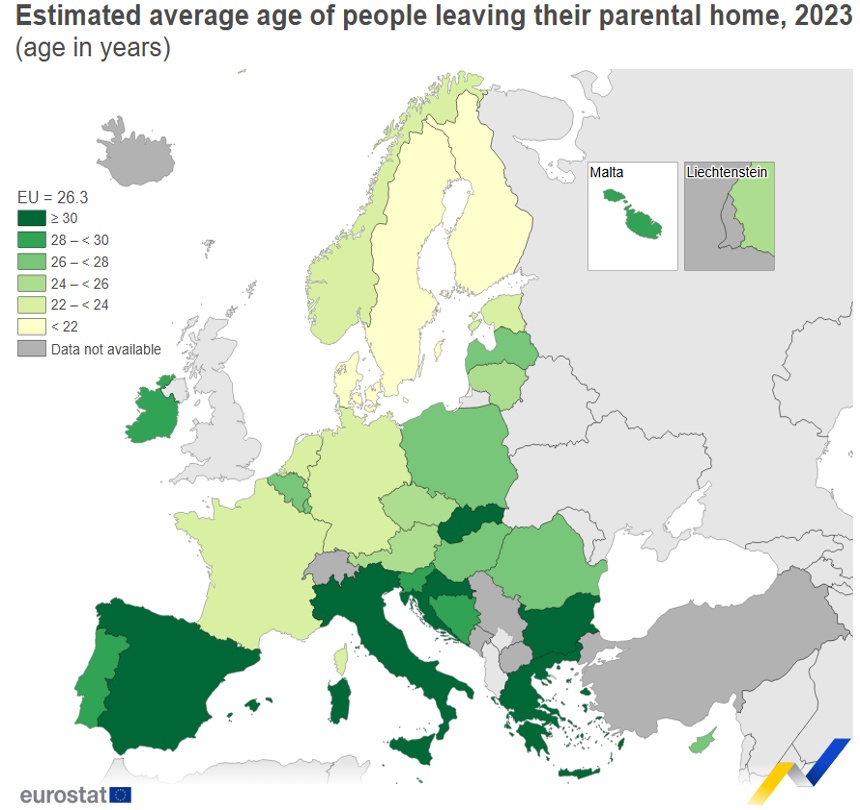Otthon Start and EU Cohesion Policy
In Hungary, the Otthon Start Programme has given a new direction to thinking about housing, making the acquisition of privately owned property accessible to many. This is one of the policy decisions that can be taken in response to the housing crisis. In this article, we examine how the European Union approaches this issue, and whether we can speak at all of a European housing policy.
Housing traditionally falls under national competence. The EU only plays a complementary and supportive role: through financing, recommendations, and professional coordination. At the same time, the second Von der Leyen Commission already treats the housing crisis as a high political priority. One sign of this is the establishment of the energy and housing portfolio, headed by the Danish Commissioner Dan Jørgensen. The choice of person cannot be a coincidence, since Denmark performs outstandingly in housing indicators – between 2015 and 2023 housing prices rose by only 37%, and young people leave the parental home on average before the age of 22.

Source: Age of leaving the parental home (2024)
Housing data reveal a strong North–South divide. While in Northern Europe housing price growth was moderate, in many places in Southern and Eastern Europe prices have doubled. Similar differences appear in the age at which young people leave the parental home: in the North often during university years, in the South often only after the age of 30.
Alarming EU trends
According to Eurostat data, in 2023, 7% of rural households and 10.6% of urban households spent more than 40% of their income on housing. Across EU countries, between 2015 and 2023, housing prices rose on average by 48% – mainly due to higher construction costs, increased interest rates, shrinking supply, and speculative real estate purchases. In Hungary, this increase was 173% – the highest in the Union – while in Finland it was only 5%, the lowest figure. Renting was also not spared from the trend: between 2010 and 2022, a growth of 18% was recorded.
The EU’s political response
President Von der Leyen will deliver her annual speech to the European Parliament on September 10, 2025. According to the Commission’s annual performance summary published on September 5, tackling the housing crisis is highlighted in the introduction as a core European civic need, alongside inflation, cost of living, and energy prices.
The European Commission has set up the Housing Task Force, which is working on a European Affordable Housing Plan. This focuses on addressing structural problems and encouraging public and private investment. The situation is illustrated by several data points:
- since 2015, the number of permits issued for new residential buildings has fallen by more than 20%
- urban rental prices rose by up to 48% between 2014 and 2023
- real-term residential investment fell by 6% between 2022 and 2024
- 17% of the EU population lives in overcrowded housing
- homelessness affects every Member State and is on the rise
Cohesion policy and housing
Cohesion policy remains one of the EU’s strongest tools. After the 2025 mid-term review by the Commission, Member States can reprogram their funds and allocate them to new priorities, such as Europe’s competitiveness, defence, housing affordability, water adaptation, or the energy transition. The report specifically highlights that the rules of the ERDF, the Cohesion Fund, and the Just Transition Fund need to be amended to ensure targeted investment support for alleviating the housing crisis. In February, Vice-President Raffaele Fitto, responsible for cohesion and reforms, confirmed that so far the EU has earmarked €7.5 billion from cohesion funds for housing, which, with national co-financing, rises to €10.5 billion. These are mainly used for energy efficiency improvements and social housing projects.
In addition, the European Parliament established in 2024 the Special Committee on the Housing Crisis, which for one year is working on concrete proposals for how the EU should address housing-related problems.
The REGI Committee report
As further parliamentary intervention, the report currently under vote by the Committee on Regional Development (REGI), entitled On the role of cohesion policy investments in addressing the current housing crisis (A-10-2025-0139),sets out several key points. First and foremost, it stresses that the right to housing is a fundamental human right, which must be the starting point of every policy. Data from recent years show alarming trends: between 2015 and 2023, housing prices in EU countries rose by an average of 48%, while in 2023, 10.6% of urban households and 7% of rural households spent more than 40% of their income on housing. According to the report, the rules of cohesion policy – especially regarding the European Regional Development Fund (ERDF), the Cohesion Fund, and the Just Transition Fund – must be amended to support targeted investments to alleviate the housing crisis. It also emphasizes that the post-2027 budget should include conditions ensuring that supported housing remains part of the community housing stock in the long term. Other important goals are curbing speculation and protecting tenants, particularly in tight markets. Finally, the Commission should develop guidance guaranteeing that all EU policies contribute to strengthening social, economic, and territorial cohesion.
During the mid-term review of cohesion policy, under the Danish presidency, negotiators from the Council and the European Parliament reached a provisional political agreement in July 2025 to allow more flexible use of funds for current and emerging challenges. The aim of the changes is to better adapt the rules of the cohesion funds – ERDF, the Cohesion Fund, the Just Transition Fund, and the ESF+ – to the altered economic, social, and geopolitical environment.
In line with the Commission’s proposals, new priorities have also been brought into the focus of cohesion policy during the review: defence and security, strengthening competitiveness, decarbonisation and energy transition, affordable and social housing, secure access to water and sustainable water management, and support for Eastern border regions.
According to the agreement, Member States will be given greater flexibility and financial incentives to mobilize their funds more quickly for these new priorities. Programmes that allocate at least 15% of their resources to these areas will receive additional pre-financing and an extension of the eligibility period.
Thus, in the future, cohesion policy will not only support traditional territorial convergence but also specifically address the housing crisis, the green transition, and security policy adaptation.
All this shows that, although it falls under national competence, the housing crisis is no longer merely a national issue but also a Union-level social challenge. Although competences are limited, the Commission and the Parliament are increasingly integrating housing into cohesion policy, into the future planning of the MFF, and are seeking new policy instruments. The goal: to ensure affordable, sustainable, and safe housing.
Source: Stuart Mitchell/Flickr






